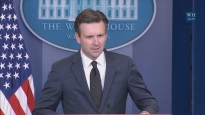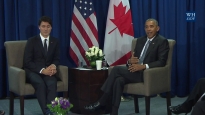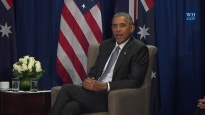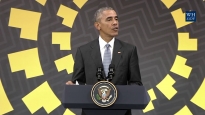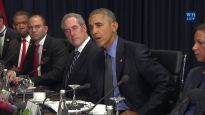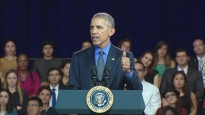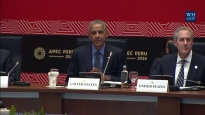Press Briefing 7/27/09
July 27, 2009 | 37:41
White House Press Briefings are conducted most weekdays from the James S. Brady Press Briefing Room in the West Wing. (public domain)
Download mp3 (34.6MB)
Briefing by White House Press Secretary Robert Gibbs, 7-27-09
THE WHITE HOUSE
Office of the Press Secretary
____________________________________________________________________________
For Immediate Release July 27, 2009
PRESS BRIEFING BY
PRESS SECRETARY ROBERT GIBBS
____________________________________________________________________________
For Immediate Release July 27, 2009
PRESS BRIEFING BY
PRESS SECRETARY ROBERT GIBBS
James S. Brady Press Briefing Room
1:37 P.M. EDT
MR. GIBBS: Mr. Babington.
Q Thank you, Robert. On health care, obviously one of the biggest problems is how to pay for it. Has the President given any more thought to the possibility of taxing these really high-end benefits that some companies pay their top people?
MR. GIBBS: Well, as I think you heard a couple of staff members say over the weekend, the administration is evaluating the Kerry proposal that would go about this through insurance companies and those that offer excessively large health plans. But I don't have any further guidance other than that investigation.
Q Because the President has seemed somewhat open to other ideas, such as Speaker Pelosi's idea of maybe an income surtax on millionaires' income and above. Does the President think that this legislation is going to get forward without him having to come out more specifically on some of these ideas?
MR. GIBBS: Well, Chuck, understand he has come out very specifically on a series of ideas that he thought was a good way to pay for this -- namely about half a trillion dollars in cost cutting savings as well as rolling back some of the charitable deduction rates to the rates that we saw during the Reagan administration. So I think the President has been involved.
Q And of course on the second point, he didn't get very much traction, if any, in the Congress --
MR. GIBBS: Well, I presume one of the reasons you're asking me this question is because some of the other things haven't gotten traction either. (Laughter.)
Q Exactly. But because of that there's not a lot of traction and August is coming. And I'm just wondering how is the dynamic going to change, what's going to change the dynamic given what seems to be almost an impasse, or at least a lot of problems in the House and the Senate?
MR. GIBBS: Well, look, I'm not sure I would categorize it as "a lot of problems." Again, I said this over the weekend, I think we're about 80 -- we have agreement on about 80 percent of the issues surrounding health care reform. There's no doubt that the 20 percent to go is not going to be necessarily easy, and it never has been. I think the President -- you've seen him both out in public and behind the scenes discussing with members of Congress how to move health care reform forward. That's what will continue to happen this week.
Yes, sir.
Q The President talked this morning about kind of coordinating with China to get a global, I guess, response to climate change for the Copenhagen summit. Has he decided for sure that he's going to attend that personally?
MR. GIBBS: I do not believe he's decided. I don't think we've made any scheduling decisions that far in advance.
Q And on the Gates and Crowley meeting, is he hoping -- what's he hoping to accomplish in the meeting? Is he hoping that they'll just make nice with each other? Is he hoping --
MR. GIBBS: Well, I think as he said the end of last week, in bringing this suggestion up with Sergeant Crowley when he was on the phone was -- obviously a big part of this is an increased dialogue between both of the individuals here and their representation of both law enforcement and the minority community. I don't have any specific guidance as to when that will happen. It's our hope to try to get something done this week.
Jake.
Q Any word on the $100 million in cuts?
MR. GIBBS: That will be out later this afternoon.
Q Okay. And then in terms of health care, is there a new deadline? Is the President -- obviously the August deadline is not operable anymore, and the President has talked about folks signing a bill by October and also signing a bill by the end of the year. Does he have in mind any other schedule for how he'd like things to proceed, knowing that he thinks that the deadline has accomplished things by spurring Congress to act?
MR. GIBBS: Well, Jake, I think the President is convinced that we have made progress over this time period and we're continuing to make progress, leading up to the recess for the House and the Senate, obviously happening at different times over the next few weeks. The President has stated he hopes final legislation will be on his desk in the fall. But there's nothing -- there's no new intermediate deadlines except to say that the President is encouraged that we're making progress and I think is satisfied with the path we're on.
Q Both in terms of this deadline and also the detainee task force deadlines the group has asked for -- the two-month and the six-month extension, respectively -- has the President learned any lessons about setting deadlines?
MR. GIBBS: Not that I know of, no.
Q Robert, following up with the President on health care last week in the news conference, he was asked about the negotiations on C-SPAN and he said -- his response in part was that --
MR. GIBBS: Are you pitching this for CNN or -- (laughter) --
Q Well, I was hoping that maybe we could talk about that after this briefing. (Laughter.) But in all seriousness, at the news conference, the President's response on C-SPAN was that the sort of opening ceremonies of the debate were on C-SPAN when you had some of the players -- but that's not really what the President promised. In August, in Virginia, I think it was, he had a campaign event and he said, "I'm going to have all the negotiations around a big table" -- have doctors, nurses, hospitals, insurance companies, drug companies, you get the idea. He went on further. What went wrong?
MR. GIBBS: Well, Ed, I appreciate that we've done a postmortem now that the entire process is over, but given the earlier questions we've got a long way to go --
Q It's not a postmortem; it's from the opening ceremonies until now. There's been a lot of negotiations and it has not been the way the President promised.
MR. GIBBS: Well, I can't speak for the committee process on Capitol Hill. I'm sure you've got calls in --
Q But it's the President of the United States, this is his initiative and he made this promise as a candidate. Why does he not follow through?
MR. GIBBS: The President feels very comfortable with the amount of transparency that we've had. The President feels -- we've done any number of events on this. We've shown who's been in here to talk to the White House. And I wouldn't shut the door on something happening further.
Q Okay, last thing on this is -- which is -- he was also asked, as part of that question about the health care executives and lobbyists who were at the White House, about the records of that. And he noted accurately that it had been released shortly before the news conference. Why did it take a group like CREW, the watchdog group, to complain about this for you to release the names of those people, when you talk about transparency?
The President -- you put out a schedule every night saying the President is having these meetings tomorrow. Why were those meetings not released in real-time during this debate, as it was played out?
MR. GIBBS: Ed, I'll let you in on a little secret: Everything that we do at the White House isn't on the daily guidance.
Q Okay. But this is a big debate that the President, as a candidate, said it's going to be open and transparent. We didn't set the standard. The President set the standard. He said --
MR. GIBBS: I feel like you should swear me in.
Q Well, because you keep kind of pushing it off with a joke or something. I'm trying to get a serious question. He made this promise.
MR. GIBBS: Right. Again, Ed, the President feels very comfortable with his level of transparency, which is why you have those names.
Q Robert, three questions. Number one, on the co-op option that is being thrown out there by the Senate Finance Committee and Senator Kent Conrad, does the administration have a position on this yet?
MR. GIBBS: I have not talked to -- that's one of the follow-ups from this morning. I have not gotten an answer from our health care guys on that versus the public option.
Q How do we characterize your guys' openness to at least studying this? Or how would -- what's a good way to characterize it?
MR. GIBBS: You can characterize it as I'm going to try to get some information on that so that I can characterize it for you.
Q No characterization. (Laughter.) How does the administration -- does the administration --
MR. GIBBS: I love how -- I love how I always get a little analysis right at the end of each one of my answers from you. Maybe that was just my little analysis at the end of one of your answers.
Q The situation with Citigroup, one of their traders may make -- may be paid some hundred million dollars. Does the administration have a position on whether this should be, this compensation should be studied by the pay czar, the Treasury Department --
MR. GIBBS: Well, I believe that the top 100 salaries of the seven firms that received extraordinary assistance under the TARP program fall obviously within the bailiwick of Mr. Feinberg's review, and I know there's an upcoming deadline on that and I don't want to prejudge that deadline.
Q Is it fair to say, though, just because your salary is under review doesn't mean your salary won't be paid, is that --
MR. GIBBS: Well, I think before you can get to that answer you've got to do the review, which is what Mr. Feinberg is doing.
Q Is $100 million for a single individual -- is that something that seems to fall outside of where the President would like --
MR. GIBBS: I think one could easily come to the conclusion that that's probably a bit out of whack on any pay scale.
Q Can you give a better idea -- would $75 million be out of whack, would $50 million? Is there a line --
MR. GIBBS: For you, or for -- (laughter.)
Q For Helen.
MR. GIBBS: Helen, I'd go easily to the $100 million.
Q No, seriously, is there -- I mean, if $100 million is over the line, what's the line?
MR. GIBBS: Well, look, I'm not going to stand up here and set salaries for traders or point guards or wide receivers --
Q Well, but you have somebody that is going to set salaries.
MR. GIBBS: -- or the companies that receive extraordinary assistance through TARP. Not surprisingly, I'll let Mr. Feinberg, again, come to that review and that conclusion. Obviously he's got a lot of experience in doing something like this.
I think you've heard the President discuss his views on executive compensation. First and foremost, and very recently he's reiterated the notion that he wants pay set based on what people are doing for their shareholders and for the good of both the company and the country. So this is not pay that is set on outsized or egregious risk-taking. That's what the President has talked about. I don't think people in this country begrudge that some people make a lot of money for what they do, as long as what they're doing and getting paid for that doesn't put the rest of us at some appreciable risk.
Secondly, as you know, the President has sent to Capitol Hill legislation that would -- this is for all companies, not just for those seven firms receiving extraordinary or exceptional assistance from TARP -- but provide shareholders with a say on pay, which has worked in countries like Great Britain, through the power of public opinion weighing in on the salaries that are ultimately set by public companies.
Q Can I follow up on that kind of looking at it from the other point of view? Is the White House worried at all that with people making a lot more -- a lot on Wall Street, suddenly salaries are pretty high again, is there some concern that if Ken Feinberg comes in and puts some pretty harsh limits on things that some of those people could leave companies like AIG and CitiBank --
MR. GIBBS: Do you want to switch the premise of your question almost entirely and ask me to defend --
Q I don't have a point of view. I ask you to defend all points of view. (Laughter.)
MR. GIBBS: I appreciate being able to do it in the span of, say, two minutes.
Q But are you worried that there may be people pushed out of those companies --
MR. GIBBS: Look, I'm sure there are people --
Q -- and then endanger their ability to pay the government back?
MR. GIBBS: I'm sure there are people with very -- obviously we've talked about the notion of what got wound up in AIG and ultimately has to be unwound. I have no doubt that there are people that in order to do that have to have some basis of knowledge of what has happened and some very technical expertise to do such a thing. I think the President, though, would come down on the viewpoint that there are very few things that people do all over this country that would ultimately make it -- that would ultimately set it to the point where that person or group of people couldn't be replaced by somebody else.
So I think if the justification of setting outside salaries is this notion of simply a series of unique skills or traits that can't be replicated by anybody on the planet, I don't know that the President would necessarily buy that notion.
Q Can I just follow, Robert?
MR. GIBBS: Let me go to Helen first.
Q Now that I'm being paid so much --
MR. GIBBS: Right, your -- (laughter) -- technically, this is your $100 million question.
Q I'll take it. What is the 80-percent agreement that the President reached where -- narrowly getting the bill passed.
MR. GIBBS: Well, I think there's broad agreement that the bill shouldn't add to the deficit. I think there's broad agreement that we have to increase access. I think there's broad agreement that we have the do something in both the short term and in the long term, meaning inside and outside a 10-year budget window, to cut costs. I think there's broad agreement on insurance reforms, that we can't let insurance companies continue to discriminate against individuals that are very sick or have a preexisting condition. And I think there's some agreement on things like limiting out-of-pocket expenses for individuals.
I think there's a broad agreement on a number of things.
Q And on the whole business of everyone at the table, why is Medicare for all wiped out and single-payer?
MR. GIBBS: Well, I think we've talked about this before, Helen. Obviously --
Q I would like you to refresh my memory.
MR. GIBBS: I'd be happy to. A preponderance of -- I forget, I think it's 60-some percent of people in this country get their health insurance through their employer. I think we've seen even over the course of the last 40 years --
Q They don't have jobs now.
MR. GIBBS: Well, some people are -- you're working; Chip, for the foreseeable future, has a job.
Q Maybe not. (Laughter.)
MR. GIBBS: Well, see. Can you help him out with a little -- we've seen how hard it is over the debate over the past 40 years to go about reforming health care in order to provide increased accessibility, in order to cut costs for families and small businesses. I think obviously the disruption of doing away with an entire employer-based system is not something that's soon going to be feasible.
Q Well, why have it employer-based? Why don't we have it linked to Social Security, Medicare?
MR. GIBBS: Well, again, I think you've got a system that is already providing -- again, I don't know the exact number -- but the vast majority of people are getting their insurance one way. I think in order to totally scrap that system and start anew -- look, I think you've heard the President say if you were building something completely from scratch, that you might look at different solutions -- but this is not a system that we're building completely from scratch; it's a system that has been in place for quite some time.
Q And can't be improved?
MR. GIBBS: Oh, no, the President is working each and every day to improve it -- absolutely.
Laura.
Q Thank you. What is the White House's view on the TV ads that a variety of liberal groups are running targeting Democrats on the health care debate, saying -- essentially pressuring Democrats to support particular plans or to support the overall effort by groups that are already sort of in your camp?
MR. GIBBS: Admittedly, I have not -- I don't --
Q Is it useful or helpful?
MR. GIBBS: I haven't seen the ads. I don't know exactly what is being said in them. I think -- I can simply speak for the President in that I think he believes, again, strongly that we've got to act and we've got to act now, that we've got to do all that we can to get agreement over these next 20 percent of the issues, and get it done in a way that gets something to his desk this year. I have not seen the specific ads or talked to the President.
Q Well, some of them, they're a little older. I mean, some from OSA, so you probably have seen those.
MR. GIBBS: Inexplicably, I haven't.
Q Let me ask -- since you didn't have an answer to that question, I'll choose something else.
MR. GIBBS: Try again. (Laughter.)
Q In terms of Chuck's question about the co-ops, I was a little confused that you didn't have an answer to that, because the President himself at various events --
MR. GIBBS: You didn't seem confused that I didn't have an answer to the previous question, but go ahead.
Q Well, I'll give you one. The President himself has said at various events that, hey, you know, if it's co-ops, I'm open to that idea too. So is that not operable anymore?
MR. GIBBS: No, I think -- the President has said, look, this is an idea that people are looking at. I think -- maybe I'm wrong, I thought Chuck's question was whether we supported one over the other. I think the President has discussed a myriad of options, but I don't think he's laid down a marker picking one over the other.
Q Wait, so we should -- it's fair to say that the public option co-op, public option is a principle, and if co-op fulfills that principle --
MR. GIBBS: Well, again --
Q I mean, you save one over the other --
MR. GIBBS: See, this is --
Q I know. I mean, look, I'm responding to her answer --
MR. GIBBS: Right, in which I think I've pretty clearly delineated Laura bringing up the fact that the President, in many interviews -- I think maybe even with John Harwood, a network you're familiar with -- where he discusses the option of looking at that.
Again, maybe I want to be clear for Laura and for you. I don't believe that the President has come down one versus the other in terms of denoting co-ops equal to or above public option. I can talk to the health team about that.
Q My impression wasn't that he had picked one over the other. My impression was that he was open to all of them.
MR. GIBBS: Right, well, that was more for Chuck's instant analysis.
Q No, I understand. So he hasn't picked -- so public option is not the preference over co-ops?
MR. GIBBS: Chuck, just let me get an answer to your question. I promise we'll -- yes, sir.
Q He's going to make the case for health care reform to the AARP tomorrow. Now, by and large, they're on your side on this. Why? Is this just because it's a friendly setting? Or does he feel he has to make the case more about the impact on Medicare? What's the deal?
MR. GIBBS: Well, look, obviously, you've got -- I presume you'll have a group participating and listening that want to know how the President's plans will affect each of them. I think the President was asked at the news conference last week to discuss cost-cutting versus quality as it related to Medicare and I think he wants to continue to make that case, as well as to broaden his pitch on health care reform to this audience and to others.
Q If I could follow on Feinberg, will the President sign off on Feinberg's pay structures? I mean, is there a court of appeal for, like, the Andrew Halls -- the people that -- you know, he's the guy with the $100 million --
MR. GIBBS: I don't know the process by which the President will see or sign off on that, but we can check.
Q Okay, and if I could follow on something that came up this morning on the mortgage issuers being here at the White House -- are they here?
MR. GIBBS: No, the mortgage servicers are -- this is a follow-up meeting to a letter -- to letters that were sent out I think to two dozen or so participants in the Home Affordability Modification Program. That group was asked to provide in these letters somebody -- a senior liaison. There's a meeting at Treasury today with Secretary Geithner and Secretary Donovan to follow up on what's in these letters, as we continue to evaluate how to improve the home modification program. We can get you another copy of the letter if you don't have one. But the meeting is not here; it's across the street.
Yes, sir.
Q Some economists -- among them, Peter Morrissey, who feel that the devaluation of the Yuan costs the U.S. as much in lost manufacturing as the stimulus bill puts back. The President didn't mention that in his speech today. Was it discussed? And is there a -- how strong is the push to get China to properly value its currency?
MR. GIBBS: Well, I forget where we are on the traditional report that comes out about this. I don't know if -- I can check with Secretary Geithner's folks and others to see the degree to which this is going to come up in their discussions throughout the day. I don't believe it -- it wasn't in the President's remarks but I'll see if it came up with Secretary Geithner and others.
Q Okay. And another subject, Officer Crowley is drinking Blue Moon, we hear Professor Gates is drinking Red Stripe or Becks -- what's the President drinking?
MR. GIBBS: The President had a Budweiser at the All-Star Game, so -- why are you looking at me like that? That's what he drank.
Q We're talking Blue Moon, Red Stripe, Becks --
MR. GIBBS: What's wrong with Budweiser? Why do you hate Budweiser? (Laughter.)
Q Well, he could get --
MR. GIBBS: Why do you hate Budweiser, Wendell? (Laughter.) Wendell, how about this -- how about you and I, we'll go pick out the beer, we'll do the beer run. Uh-oh, hold, please. (Laughter.)
Q I'm happy to do that.
MR. GIBBS: The mortgage services meeting is tomorrow. Apparently this has nothing to do -- (laughter) -- unclear whether beer will be served at that meeting and what it will be. (Laughter.) So we'll go on the beer run together and pick it up in anticipation of the meeting.
Q Pretzel or chips?
MR. GIBBS: Say again?
Q Pretzel or chips?
MR. GIBBS: We're just going to go straight beer. No sense in diluting it.
Yes.
Q Shifting gears to Afghanistan. U.S. casualties are rising, as might be expected with the surge in troops. But a lot of these casualties are rising in the east, not where the troops are. I'm wondering if the White House is making some real-time appraisals of the deployment, how successful it's been, if the surge is taking place in the right area -- those kinds of --
MR. GIBBS: Let me talk a little bit more specifically to NSC about your question. I know that there is a constant review process that's ongoing, first in the beginning of the administration, as you know, in the ramp-up to elections for the additional troops, and I know that General McCrystal continues and General Petreaus continue to evaluate that. I don't know if there's any specific modifications on that.
Q Can I follow up on that?
MR. GIBBS: Yes.
Q What is the administration's expectations now, considering that in terms of a fair and open political -- election process?
MR. GIBBS: I'm sorry?
Q What are the administration's expectation in terms of what the gentleman just said, in terms of a fair and open election process?
MR. GIBBS: Well, I think that we're continuing to watch. We believe it's certainly well within the power of the government to conduct an election that is free and fair, and I think we would, the international community and certainly the Afghan people would expect nothing less.
Yes.
Q Is Vice President Biden freelancing on Russia? The Russians seemed to imply that last week. They responded to his tough comments by saying they weren't sure that he was speaking for the administration and even brought up a comparison to Dick Cheney. Does the White House stand behind what he said last week?
MR. GIBBS: Well, as we told your paper on Saturday night, the President and the Vice President are in agreement that Russia -- it's in our national interest to have improved relations with Russia, just as it is in Russia's national interest to seek improved relations with this country on a whole host of issues that are important to each. I think it's safe to say that the President addressed a lot of these issues on his recent trip to Moscow, and the Vice President is supportive of those policies.
Q So the White House stands behind Biden's statements that the U.S. would not get into some sort of negotiating game with the Russians for you giving up on Georgia versus something else?
MR. GIBBS: Well, I think I'd let the President's comments and my earlier statement on this stand.
Q Robert, briefly, do you have any comment on the 911 tapes from the Gates arrest which show police saying that -- radio, in fact, that Mr. Gates is being uncooperative?
MR. GIBBS: I saw something came out but I have not looked at anything like that or the transcripts.
Q On Medicare, before the AARP thing tomorrow -- the President has often pointed to Mayo Clinic as such an example. Mayo Clinic doesn't accept Medicare. It's a non-participating provider. Medicare patients can go there; they have to pay their bill and then they get whatever they can from Medicare. Is that the kind of approach that the President supports?
MR. GIBBS: I don't think tomorrow is about highlighting the specifics of what Mayo does as it relates to Medicare. What we want to make sure is that when a Medicare recipient goes to a doctor, that they receive the highest quality care, but that we're also convinced that we can make a system more efficient. We talked a little bit about recommendations that have come to Congress about cutting waste and inefficiency from the Medicare budget.
One of the primary examples that we have used a lot is the Medicare Advantage program, which is a subsidy that's paid to private insurance companies basically to operate Medicare in largely the same way with no genuinely appreciable benefits. That's something we want to cut and we think could save upwards of $200 billion a year in order to do that.
Q Mayo Clinic, on its Web site, said that last year alone it lost $840 million treating Medicare patients because -- and you want to squeeze even more savings out of that?
MR. GIBBS: Well, I'm not entirely following the notion of where one hospital is and where --
Q Do you still want a savings in how Medicare pays providers -- the hospitals --
MR. GIBBS: Well, I think there's a whole host of things that can be made more efficient. Like I said, I just offered up a $200-billion idea that I don't think is going to affect the hospital.
Q You still think Mayo is a great example?
MR. GIBBS: I think if I got sick and I got sent to the Mayo Clinic, yes, I'd feel pretty good.
Yes, sir.
Q Thanks, Robert. Is the Vice President becoming more of a distraction to the President's agenda?
MR. GIBBS: No.
Q There have been a number of comments that have been coming up more frequently over the last few months where the administration has had to clarify or correct something that he's said. You don't think that that's a distraction?
MR. GIBBS: No.
Q Do you think that the way that he's making these comments is helpful to the President's agenda?
MR. GIBBS: I think the President and his team are enormously helped by the Vice President, whether it is the implementation of the stimulus or -- ranging from things like the implementation of the stimulus to being involved in the politics and the political reconciliation that has to happen in order to make Iraq a safer place, and to see us fulfill our commitment to remove our troops under the timetable that the President has proposed. I think he's an enormous asset to the administration.
Q You didn't mention Sotomayor. Was he an asset on that?
MR. GIBBS: Yes. I didn't list everything I think he's good at. (Laughter.)
Yes, sir.
Q Robert, I hate to bring this up but somebody has to.
MR. GIBBS: Uh-oh.
Q Is there anything you can say that will make the birthers go away?
MR. GIBBS: No. (Laughter.) I mean, the God's honest truth is no. I mean, Bill, let's understand this -- and I almost hate to indulge in such an august setting as the White House -- and I mean this in seriousness -- the White House briefing room discussing the made-up, fictional nonsense of whether or not the President was born in this country. A year-and-a-half ago I asked that the birth certificate be put on the Internet because lord knows, you got a birth certificate and you put it on the Internet, what else could be the story?
Here's the deal , Bill. If I had some DNA, it wouldn't assuage those that don't believe he was born here. But I have news for them and for all of us: The President was born in Honolulu, Hawaii, the 50th state of the greatest country on the face of the earth. He's a citizen.
But I have no doubt that Lester will ask me soon, and that I will receive e-mail --
Q You're wrong -- I've got another question. (Laughter.)
MR. GIBBS: I'm not entirely sure about that, Lester. But let's not --
Q Let me prove it. Let me prove it. (Laughter.)
MR. GIBBS: I'm happy to wager that you'll never ask me another birth question again.
Q No, no, no -- I didn't say "never again," I said, "not today."
MR. GIBBS: See, there we go. I'll take my winnings and put it in my son's college fund. But no, nothing will assuage them. But there are 10,000 more important issues for people in this country to discuss, rather than whether or not the President is a citizen.
Q Why do you think it keeps coming up?
MR. GIBBS: Because for $15, you can get an Internet address and say whatever you want.
Yes, sir.
Q Thank you, Robert. The President is sending Secretary
Gates and George Mitchell to the Middle East. Can you confirm that he also wrote letters to a series of heads of state in the Arab countries, to push them for confidence-building measures towards Israel?
MR. GIBBS: Well, we have -- I think the President mentioned -- alluded to some of this in the speech that he made in Cairo. The President has called on all sides to take steps to create a climate for the resumption and the conclusion of negotiations towards a two-state solution. So I don't think this is anything extraordinary.
Q But he did send those letters to --
MR. GIBBS: The President has sent some letters, yes.
April.
Q Robert, a group of ministers from around the country, they're looking, in the next couple of weeks, of holding a day of action and prayer on the issue of racial profiling, somewhat of an impetus and outgrowth of all this Gates-Crowley situation. And they're calling for a serious and civil conversation on police relations with the black community, and for a federal investigation of the Cambridge Police Department, which, they say, has a history of racial issues. So what say you to their request?
MR. GIBBS: You should talk to the Department of Justice.
Q But the President, Friday, reiterated the sensitivity within the black community. And he understood that African Americans have a problem or there is some problems between some policing organizations in this country and the black community, and he made those comments. Is there anything that this administration is doing to further promote or work with what he said?
MR. GIBBS: Not that I'm aware of, but again, there may be somebody at Justice that has a better update on that.
Q And could you talk about this incident where there was maybe alleged racial profiling of the President years ago?
MR. GIBBS: I just have what I've read in the Chicago Tribune, but I don't have anything beyond that.
Q When the President talked about the situation, you guys didn't talk about this?
MR. GIBBS: I didn't work for him in 2003 so --
Q But did you talk, with this most recent situation, as you advised him, about what was going on in the media?
MR. GIBBS: He didn't talk about it and, like I said, I didn't work for him in 2003 so didn't know about the article until somebody brought it to my attention.
Q Robert, just one question? Just one?
MR. GIBBS: Not today. (Laughter.)
Q Not today?
MR. GIBBS: Not today.
Yes, sir.
Q I want to go back to the public option. When it was initially conceived, it was thought of as a massive entity whereby over a hundred million people could conceivably get coverage, structured like Medicaid. Today we're talking about it being a co-op or a public option with triggers. Do you think the debate has switched a little bit too far away from a robust public option, and is the President sad in that we've moved so far to the left that we have to compromise it down so much?
MR. GIBBS: I'm sorry, run that whole series of caveats by me one more time.
Q The public option was initially conceived, intellectually, as something that would handle 100 million uninsured people, or people who want to get insurance.
MR. GIBBS: Well, remember, just -- let me -- I'll interrupt as we go along. And I think we've discussed in here, there would -- there's conceptualized a firewall that would not allow somebody to simply shrug off the insurance that they're offered as part of their employer-based system in order to simply go into some sort of public option. So I'm not entirely sure that's where this whole [thing] started out, but finish the last part.
Q Well, I guess I'll switch topics then. Chuck Grassley says -- (laughter.)
MR. GIBBS: What?
Q Well, this is related. Chuck Grassley says he had a private conversation with President Obama in which the President said, I'm interested in alternatives to the public option. Can you confirm that that's accurate?
MR. GIBBS: I'll certainly ask somebody. I don't -- I'm not involved in their private conversations, so I don't know the answer to that.
Yes, sir.
Q Could you tell us what does the President hope to achieve by having four U.S. officials in the Middle East at the same time, including Secretary Gates?
MR. GIBBS: Well, right, we have Senator Mitchell, our envoy to the Middle East. We have General Jones, and we have Secretary Gates. Obviously, each of them has -- General Jones is representing an interagency group. Obviously, Secretary Gates is meeting with defense counterparts in Israel. And Senator Mitchell is meeting with a number of people, including, I believe, Prime Minister Netanyahu, in order to continue our push to see progress on aspects of long-term Middle East peace.
Q Could you confirm that --
MR. GIBBS: I don't know who the fourth one is. Say again?
Q Dennis Ross is --
MR. GIBBS: Dennis Ross?
Q Is on the way, as well, to --
MR. GIBBS: That I don't know the answer to. Is he? Oh, Dennis is with General Jones, yes.
Q In 2007, presidential candidate Obama told Planned Parenthood activists that reproductive care was at the center and the heart of his health care plan, and that both private, federally subsidized insurers and his public plan would be required to provide reproductive care. And contacted by the Chicago Tribune, they said that that including abortions. Does the President believe that he can subsidize abortions with federal funds while fulfilling his pledge to reduce the number of abortions at the same time?
MR. GIBBS: Let me look up the statement that he made at that time period. I think as I said last week, the administration's position is, obviously, you are not going to -- we're not interested, through health care reform, in changing the current rules of the road federally, as it relates to Medicaid, in terms of what option or what benefit is ultimately set up through health care options; that's going to be determined when a benefit is structured by medical professionals.
Q Well, Congressman Stupak believes that there are 39 Democrats who would vote against the bill if it didn't explicitly exclude coverage for abortion. Has President Obama spoken to any of those Democrats?
MR. GIBBS: My sense is he has probably spoken to them as it relates to overall health care reform. But I've been -- Congressman Stupak, I don't have a sense of who those guys are. But we can certainly look into it.
Thanks, guys.
END
2:15 P.M. EDT
2:15 P.M. EDT
|
November 22, 2016
|
November 22, 2016
|
November 20, 2016
|
November 20, 2016
|
|
November 20, 2016
|
November 19, 2016
|
November 19, 2016
|
November 19, 2016
|
- &lsaquo previous
- …
- 6
- 7
- 8
- 9
- 10
- 11
- 12
- 13
- 14
- …
- next &rsaquo

